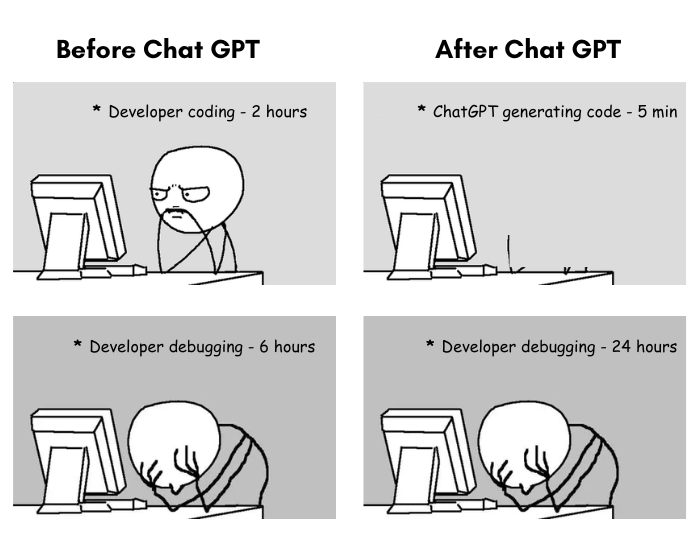FTC Investigates OpenAI's ChatGPT: What This Means For AI Development

Table of Contents
The FTC's Concerns Regarding ChatGPT and OpenAI
The FTC's investigation into OpenAI likely stems from several key concerns surrounding ChatGPT and its implications.
Data Privacy and Security
A primary concern revolves around how ChatGPT handles user data, especially sensitive personal information revealed during conversations. This raises significant data privacy and security issues.
- Potential violations of COPPA (Children's Online Privacy Protection Act): The FTC may be investigating whether OpenAI adequately protects the data of children using ChatGPT, potentially violating COPPA regulations.
- GDPR (General Data Protection Regulation) compliance: OpenAI's compliance with the GDPR, particularly concerning user consent and data processing, is likely under scrutiny, especially for users within the European Union.
- Data breaches and unauthorized data usage: The FTC is likely assessing OpenAI's security measures to prevent data breaches and ensure that user data is not used for unauthorized purposes. The potential for misuse of sensitive information is a major area of concern.
- Bias in Training Data: The datasets used to train LLMs like ChatGPT are massive and may reflect existing societal biases. This can lead to AI systems perpetuating and even amplifying these biases, resulting in unfair or discriminatory outcomes. Addressing this bias is a significant challenge in AI development.
Misinformation and Harmful Content
ChatGPT's capacity to generate realistic yet false information is a significant cause for alarm. Its potential for misuse in spreading misinformation and harmful content is a key focus of the FTC's investigation.
- Deepfakes and propaganda creation: ChatGPT can be used to create convincing deepfakes and propaganda, potentially manipulating public opinion and causing significant harm.
- Impact on elections and public discourse: The potential for AI-generated misinformation to influence elections and public discourse is a major concern. The FTC's investigation likely aims to understand the extent of this risk.
- Challenges in detecting AI-generated disinformation: Distinguishing between AI-generated content and human-generated content is increasingly difficult, making the detection and mitigation of misinformation even more challenging. This poses a significant threat to trust and credibility.
Algorithmic Bias and Discrimination
The algorithms underpinning ChatGPT may reflect and amplify existing societal biases, potentially leading to discriminatory outcomes. The FTC's investigation is likely scrutinizing this aspect of OpenAI's technology.
- Examples of biased outputs: Instances of ChatGPT generating biased or discriminatory outputs are likely being examined as evidence of algorithmic bias.
- Fairness and accountability in AI systems: The investigation highlights the need for fairness and accountability in AI systems, requiring mechanisms to mitigate bias and ensure equitable outcomes.
- Difficulties in mitigating bias in large datasets: Removing bias from the massive datasets used to train LLMs is a significant technical challenge, requiring innovative solutions and ongoing efforts. This necessitates ongoing research and development.
Implications for AI Development and the Future of the Industry
The FTC's investigation has profound implications for the AI industry's future.
Increased Scrutiny and Regulation
The FTC's action signals a likely increase in regulatory scrutiny of the AI sector.
- Potential for new laws and regulations: This investigation could spur the creation of new laws and regulations governing AI development and deployment.
- Impact on innovation: While regulation is necessary, excessive regulation could stifle innovation in the AI field. Finding a balance between responsible development and innovation is crucial.
- Need for a balanced approach: Policymakers must strive to create a regulatory framework that fosters responsible AI development while encouraging innovation.
Impact on OpenAI and its Competitors
The investigation could significantly impact OpenAI's financial stability, reputation, and future development plans.
- Potential for fines and legal battles: OpenAI may face substantial fines or protracted legal battles as a result of the FTC's investigation.
- Impact on investor confidence: The investigation could negatively affect investor confidence in OpenAI and the broader AI sector.
- Influence on competitors' strategies: Other AI companies are likely to adjust their development strategies in response to the increased scrutiny.
The Need for Ethical AI Development
The investigation underscores the urgent need for ethical and responsible AI development practices.
- Importance of transparency: Transparency in AI algorithms and data usage is crucial for building trust and accountability.
- Accountability for AI systems: Mechanisms for holding developers accountable for the actions and outcomes of their AI systems are necessary.
- Ethical considerations throughout the development lifecycle: Ethical considerations must be integrated into every stage of the AI development process.
- Multi-stakeholder approach: A collaborative effort involving developers, policymakers, ethicists, and the public is essential for fostering responsible AI development.
Conclusion
The FTC's investigation into OpenAI's ChatGPT highlights the growing importance of addressing the ethical and societal implications of rapidly advancing AI technologies. The outcome will significantly influence the future of AI development, shaping regulatory landscapes and prompting greater scrutiny of data privacy, algorithmic bias, and the spread of misinformation. Understanding the complexities of this case is crucial for all stakeholders involved in the creation and deployment of AI, especially concerning the responsible development and use of large language models. Staying informed about the FTC investigation and future regulations surrounding ChatGPT and similar AI technologies is crucial for navigating the evolving ethical and legal challenges in the field of AI development.

Featured Posts
-
 Agam Berger And Daniel Weiss March Of The Living Performance After Hostage Release
May 26, 2025
Agam Berger And Daniel Weiss March Of The Living Performance After Hostage Release
May 26, 2025 -
 Rio Tintos Pilbara Project A Response To Environmental Concerns Raised By Andrew Forrest
May 26, 2025
Rio Tintos Pilbara Project A Response To Environmental Concerns Raised By Andrew Forrest
May 26, 2025 -
 Armando Iannuccis Creative Evolution A Look At Shifting Satirical Styles
May 26, 2025
Armando Iannuccis Creative Evolution A Look At Shifting Satirical Styles
May 26, 2025 -
 Van Der Poel Outsprints Pogacar Winning Milan San Remo Twice
May 26, 2025
Van Der Poel Outsprints Pogacar Winning Milan San Remo Twice
May 26, 2025 -
 Craig Mc Ilquham Hells Angels Memorial Service Report Sunday
May 26, 2025
Craig Mc Ilquham Hells Angels Memorial Service Report Sunday
May 26, 2025
Latest Posts
-
 Arsenals Interest In Luis Diaz Fact Or Fiction
May 28, 2025
Arsenals Interest In Luis Diaz Fact Or Fiction
May 28, 2025 -
 Kanye West And Bianca Censori A Report On A Difficult Divorce Attempt
May 28, 2025
Kanye West And Bianca Censori A Report On A Difficult Divorce Attempt
May 28, 2025 -
 Diaz To Arsenal A Realistic Possibility
May 28, 2025
Diaz To Arsenal A Realistic Possibility
May 28, 2025 -
 Bianca Censori Seeks Divorce From Kanye West A Report On Her Challenges
May 28, 2025
Bianca Censori Seeks Divorce From Kanye West A Report On Her Challenges
May 28, 2025 -
 Transfer News Arsenal And Luis Diaz
May 28, 2025
Transfer News Arsenal And Luis Diaz
May 28, 2025
